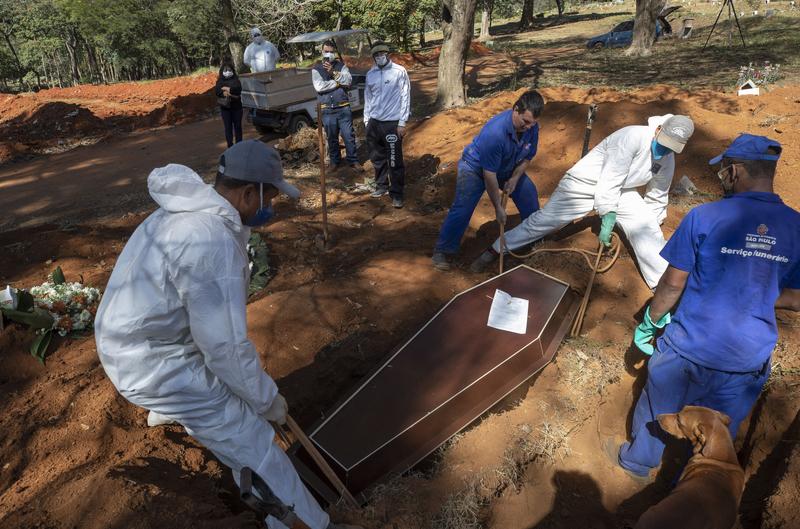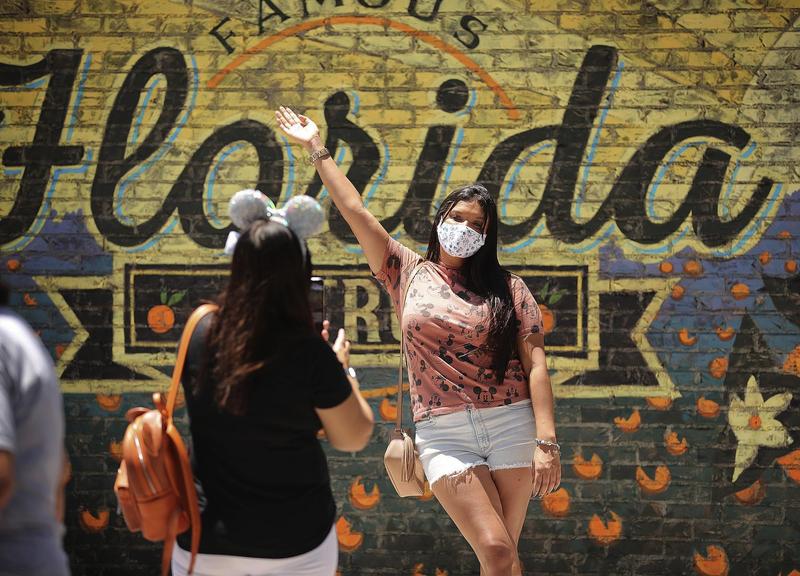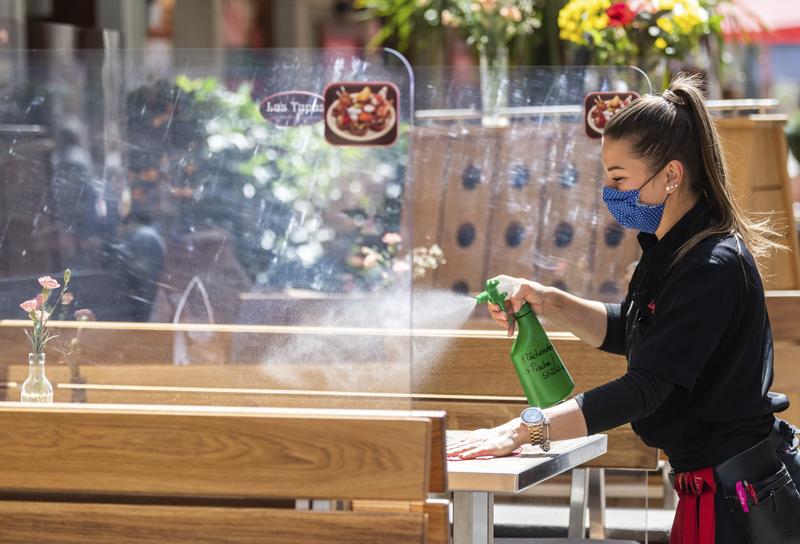 Cemetery workers in protective clothing lower the coffin of 58-year-old Paulo Cesar dos Santos, who died of COVID-19, at the Vila Formosa cemetery in Sao Paulo, Brazil, May 28, 2020. (ANDRE PENNER / AP)
Cemetery workers in protective clothing lower the coffin of 58-year-old Paulo Cesar dos Santos, who died of COVID-19, at the Vila Formosa cemetery in Sao Paulo, Brazil, May 28, 2020. (ANDRE PENNER / AP)
BERLIN / MEXICO CITY / CIUDAD JUAREZ / New York / JOHANNESBURG / PARIS / LISBON / MADRID / SOFIA - Brazil overtook Spain and now ranks fifth in the world in number of coronavirus deaths as the infection continues to spread through Latin America’s largest economy.
The country reported 1,124 new deaths Friday, pushing the total to 27,878. In number of infections, Brazil is already second globally with 465,166 cases, trailing only the US.
A disjointed response that included different and often contradictory rules that varied from state to state and even city to city has made the nation of 210 million people a hotspot for the disease. Once restricted to rich neighborhoods and capitals in close contact with international travelers, now the virus has migrated to poorer regions and also inland. There are cases in 70 percent of Brazilian cities, the Health Ministry said on Friday. With winter approaching the Southern Hemisphere, the country is entering a period of increased cases of respiratory diseases, further adding to concern.
There’s no indication the pandemic is slowing. Earlier this week, the Health Ministry said the curve of cases was still growing, and report by UBS published Wednesday said that six of Brazil’s 27 states are peaking, while total deaths are increasing in 21 states. Still, some states including Sao Paulo have started to set guidelines to restart businesses as the two months of loosely enforced quarantines take a toll on the economy.
On Friday, data showed gross domestic product fell 1.5 percent in the first quarter from the previous three-month period, the biggest quarterly tumble in nearly five years and the strongest indication yet that Latin America’s largest economy is on the cusp of a historic recession. The coronavirus outbreak has caused a crisis in confidence, decimated jobs and undercut both company and consumer spending.
US
New York City is “on track” to enter phase one of reopening on June 8, New York Governor Cuomo said on Friday as he announced that five upstate regions will now transition to phase two which includes businesses like barber shops and hair salons.
The most populous US city, which has become the epicenter of the country’s coronavirus pandemic, was on track to meet the metrics for a safe reopening, Cuomo said.
New York City is the only one of the state’s 10 regions that has not met the seven health benchmarks for reopening set by state authorities.
The Finger Lakes, Mohawk Valley, Southern Tier, North Country and Central New York are the five regions cleared to enter phase two and allow services like barber shops and in-store shopping to resume, with restrictions like 50 percent occupancy and face coverings.
 Guests take pictures at Disney Springs in Orlando, Florida, on May 20, 2020. Officials from SeaWorld and Disney World say they hope to open their theme parks in Orlando, Florida, in June and July. A city task force approved the plans on Wednesday, May 27, 2020. (STEPHEN M. DOWELL / ORLANDO SENTINEL VIA AP)
Guests take pictures at Disney Springs in Orlando, Florida, on May 20, 2020. Officials from SeaWorld and Disney World say they hope to open their theme parks in Orlando, Florida, in June and July. A city task force approved the plans on Wednesday, May 27, 2020. (STEPHEN M. DOWELL / ORLANDO SENTINEL VIA AP)
Meanwhile, Florida officials have approved plans for a phased reopening of Walt Disney World in Orlando starting on July 11, according to a memo from a state agency released on Friday.
The successful reopening of its parks is a signal event for Disney and the rest of the world as governments and companies strategize how to move out of lockdown while the novel coranavirus is still a threat.
The state also cleared Sea World Entertainment Inc to reopen on June 10, said Halsey Beshears, secretary of Florida’s Department of Business and Professional Regulation, in a memo sent to officials in Orange County, Florida.
ALSO READ: Trump says US terminating relationship with WHO
Mexico
Mexico on Friday registered 3,227 new cases of the coronavirus and 371 more deaths, bringing the total numbers to 84,627 cases and 9,415 fatalities, according to data from health authorities.
Twelve migrants have tested positive for coronavirus at a government-run shelter in the Mexican border city of Ciudad Juarez, the Mexican labor ministry said in a statement on Friday.
The migrants have been isolated to prevent further spread of the virus in the Leona Vicario center, which houses 337 people, the ministry said.
Mexico faces a sluggish exit from coronavirus lockdown as government guidance on next week’s planned easing of restrictions showed on Friday that nearly the entire country was still stuck in the highest red phase of contagion alert.
From June 1, the government had planned to start reopening the country from anti-coronavirus measures. Instead, deaths and new infections from the pandemic have scaled new peaks this week, dampening expectations for major changes.
Germany
German Chancellor Angela Merkel has refused to accept US President Donald Trump’s invitation to attend an envisaged summit of the Group of Seven (G7) in the United States, Politico reported on Friday.
“The federal chancellor thanks President Trump for his invitation to the G7 summit at the end of June in Washington. As of today, considering the overall pandemic situation, she cannot agree to her personal participation, to a journey to Washington,” the report quoted German government spokesman Steffen Seibert as saying.
“She will of course continue to monitor the development of the pandemic.”
Trump believes there would be “no greater example of reopening” than holding a G7 summit in the United States near the end of June, the White House said on Tuesday.
 An employee of a restaurant in the Muenzgasse street disinfects tables, which are separated by plexiglas panels in Dresden, Germany, May 29, 2020. (ROBERT MICHAEL / DPA VIA AP)
An employee of a restaurant in the Muenzgasse street disinfects tables, which are separated by plexiglas panels in Dresden, Germany, May 29, 2020. (ROBERT MICHAEL / DPA VIA AP)
The number of confirmed coronavirus cases in Germany increased by 738 to 181,196, data from the Robert Koch Institute (RKI) for infectious diseases showed on Friday.
The reported death toll rose by 39 to 8,489, the tally showed.
Belgium
Belgium will allow cross-border travel to visit family members in neighbouring countries from Saturday, in a slight easing of travel restrictions imposed to curb the coronavirus, the interior minister said on Friday.
Belgian Interior Minister Pieter De Crem said on Facebook that a ministerial decree will be published on Saturday.
“From tomorrow it will again be possible to visit family members in our neighbouring countries,” he said.
De Crem said travellers must comply with coronavirus precautions in bordering countries - France, Luxembourg, Germany and the Netherlands.
France
France’s coronavirus deaths rose by less than 100 for the ninth day running on Friday and new confirmed cases slowed again as the country gears up for easing lockdown.
The Louvre museum in Paris will reopen on July 6, it said on Friday, as France’s historical and cultural sites emerge gradually from the coronavirus lockdown
France is to allow restaurants, bars and cafes to reopen from June 2 - though with more restrictions in Paris than elsewhere - while the government is also lifting a nationwide 100 km travel restriction.
Earlier in the day, statistics agency INSEE said fewer people died in France in early May than in the same period the two previous years following high excess death rates during the March-April peak of the epidemic.
The Louvre museum in Paris will reopen on July 6, it said on Friday, as France’s historical and cultural sites emerge gradually from the coronavirus lockdown.
The French health ministry said the number of fatalities rose by 52, or 0.2 percent, to 28,714, the fourth highest in the world.
New confirmed cases were up 0.4 percent - after a spike of 2.3 percent on Thursday due to better data tracking - at 149,668.
The ministry said the number of people in hospital fell by more than 500, or 3 percent, to 14,695, and the number of people in intensive care fell by 68, or 4.8 percent, to 1,361.
Both numbers have been on a downward trend since mid-April.
Portugal
Portugal gave the green light on Friday to the third phase of its lockdown exit, but some restrictions will remain in Lisbon due to localised outbreaks in industrial hubs and outskirts.
From June 1, shopping malls, childcare centres, gyms, cinemas, theatres and other cultural venues can reopen across most of the country but with capacity restrictions.
Gatherings of up to 20 people will be allowed, and the 50 percent capacity rule on restaurants in place since their reopening on May 18 will be lifted.
But in Greater Lisbon, where most recently reported cases were located, gatherings remain limited to ten people, and shopping malls stay closed until at least Thursday.
Portugal, which has recorded 31,946 confirmed COVID-19 cases and 1,383 deaths backed by Europe’s fourth highest testing rate, began lifting a handful of restrictions imposed during a six-week lockdown from May 4.
Portugal’s economy, which was slowly recovering from a severe debt crisis, is expected to contract by 8 percent this year, according to the International Monetary Fund, above the European Commission’s predictions of a 6.8 percent drop.
Spain
Four small Spanish islands will be able to open the outside terraces of bars and restaurants to 75 percent of their capacity from Monday, the government said, a further easing of coronavirus lockdown rules for parts of the country least affected by the disease.
Tables on terraces must still be kept 1.5 meters apart, according to regulations published by the government’s Official Bulletin on Saturday and affecting La Graciosa, El Hierro and La Gomera in the Canary Islands, and Formentera in the Balearics.
Spain, one of the countries in Europe worst hit by the disease, has been lifting restrictions in a phased fashion, with some regions deemed safer than others to move back to normal.
In the four islands entering phase 3, groups of up to 20 people can meet and shopping centers will be allowed to re-open at 40 percent of capacity. Hotels and other leisure establishments can have common areas up to 50 percent of capacity.
Companies should still encourage home working but also can organize the return of workers to the office as long as their arrival is staggered. Museums will be allowed to organize activities.
Spain has recorded more than 238,000 confirmed cases of COVID-19, with more than 27,000 deaths.
The rate of infection has slowed substantially. Thirty-nine people died during the past week compared with a daily death toll in the hundreds a month ago, the health ministry said on Friday.
Bulgaria
Bulgaria will lift an obligatory 14-day quarantine from June 1 for travellers from most European Union countries, but not those states with the biggest coronavirus outbreaks, the government announced on Friday.
The quarantine will remain obligatory for travellers from Sweden, Belgium, Ireland, Portugal, Spain, Italy and Malta, as well as the UK, which is in a transition period after leaving the EU, according to an order issued by Health Minister Kiril Ananiev.
The Balkan country of 7 million people registered eight new cases of the coronavirus on Friday, bringing the total registered cases to 2,475, including 136 deaths
A ban on the entry of visitors from outside the EU will remain in place, although there will be exemptions for citizens of the Schengen zone countries, the United Kingdom, San Marino, Andorra, Monaco, Vatican City as well as Serbia and North Macedonia.
Bulgaria has eased most of the restrictive measures it imposed in March to combat the coronavirus spread, allowing restaurants, cafes, gyms and theatres to reopen and lifting a ban on travel between cities.
Last week it lifted a ban on the entry of citizens from EU countries, but imposed a 14-day quarantine. By allowing visitors from other parts of the EU it hopes to restore trade and boost summer tourism to its Black Sea resorts, hard hit by the lockdown.
The Balkan country of 7 million people registered eight new cases of the coronavirus on Friday, bringing the total registered cases to 2,475, including 136 deaths - a much lower rate than many other EU countries.
READ MORE: Virus: 8m workers to return to work in South Africa on June 1
South Africa
South Africa reported a record 1,837 new infections on Friday, just three days before the nation eases a lockdown that will let millions of people back to work. The country’s cases reached 29,240, the most in Africa, and 611 deaths.
Extending the lockdown -- imposed on March 27 -- is unsustainable even though infections have yet to peak, because hunger, poverty and unemployment are increasing, Health Minister Zweli Mkhize said.
South Africa has a backlog of more than 96,000 unprocessed specimens awaiting coronavirus tests, the health ministry said on Friday, reflecting what it called a global shortage of test kits.
The country has taken some of the most decisive measures on the African continent to tackle the spread of the virus, conducting the most tests and imposing one of its strictest lockdowns.
But it is finding it hard to ramp up testing as much as it would like because some global suppliers are unable to meet its demand for laboratory kits, Zweli Mkhize said in parliament this week.
Russia
Russia on Saturday reported 181 deaths from the coronavirus in the last 24 hours, down from the record 232 deaths registered the previous day and pushing the nationwide death toll to 4,555.
Officials said 8,952 new infections had been confirmed, bringing the national tally to 396,575, the third highest reported total in the world after the United States and Brazil.


